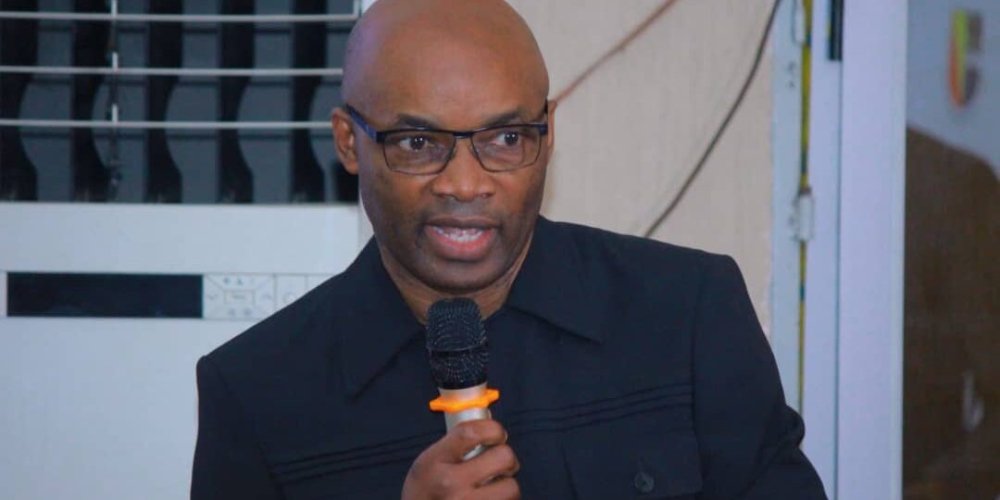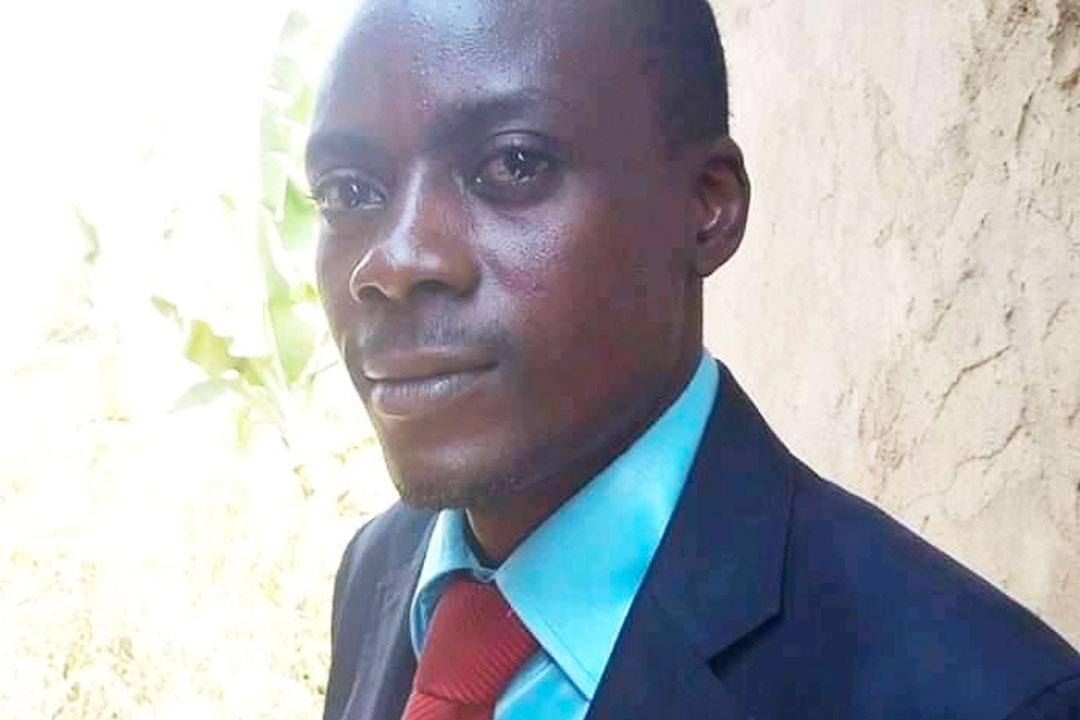Fabrice Epstein is a thirty-year-old lawyer, also known to be an innovator of the law by uberising[1]practice of the law. In 2019, he published a book entitled “Un génocide pour exemple”, it is in this context that he accepted to give us an interview.
Jambonews: Mr. Epstein, thankyou for this interview, can you please introduce yourself briefly?
Fabrice Epstein: Hello, thank you for giving me this interview. I have been a lawyer for more than ten years. My daily practice is in the field of business law. I also act as defence counsel in international criminal law trials for Rwandans accused of genocide and crimes against humanity in France.
Jambonews: Why is title of the book “Genocide as an example“, when the true story in the book is much more than genocide. One could even suggest that it’s the story of a life in which genocides invited themselves. So why this title?
Fabrice Epstein: Your observation is very correct. My life, if you can put it this way, is irrigated by genocide. The originality of the book is to link the Shoah and the Tutsi genocide, and above all to move from an inherited position of a victim to that a chosen one as a defense attorney of “alleged genocidaires”. Initially, the book was to be called genocide as a legacy. I had “inherited” the Shoah and the Tutsi genocide entered my professional and personal life because for such subjects, one cannot go without the other. Afterwards, focusing on the Simbikangwa case, the title changed to focus on the fact that Simbikangwa’s trial had been an example of justice to appease consciences. The first convicted in France for genocide, first convicted in France for the Rwandan genocide, based on false testimonies, he had been a genocidaire as example. France condemned a foreigner for genocide, whereas it had “only” condemned the French nationals or foreigners involved in the Shoah, for crimes against humanity. The Rwandan genocide was therefore genocide as example.
Jambonews: You discovered Rwanda in 2007 during a trip as part of your law studies, before that date had you heard about Rwanda?
Fabrice Epstein:Yes, I discovered Rwanda and Tanzania on a study trip. I have two very vivid memories of television moments when I was young (under 13 years of age, the age at which Judaism makes a child a man): the murder of Yitzhak Rabin, and the infamous images of an Interahamwe killing people ashore. So it was in April 1994 that I heard about Rwanda during the genocide. Everyone was indifferent; it seemed far away, unlike Yugoslavia. At that time, I didn’t think that one day I would be close to Rwanda and Rwandans.
Jambonews: When you went to Rwanda, did you have any particular expectations?
Fabrice Epstein: When I went to Rwanda, it was in 2007, just after Bruguière issued his magistrate’s order. Besides, we had to leave in 2006, the trip was postponed because of the evolution of the investigation into the Habyarimana attack. I was blank of all knowledge; I had simply read a book by Gourevitch, “We Wish to Inform You That Tomorrow We Will Be Killed with Our Families”. I had a lot of questions about the psychology of Rwandans. I wondered if the Tutsis were, like the Jews, (in my imagination), the eternal victims. My trip to Rwanda and Tanzania would raise new questions; especially the desire to know more because people were not talking about genocide, about ethnic groups. And then I had the feeling that this story had a dose of complexity that I couldn’t grasp.
Jambonews: What made the most impression on you in Rwanda? In both a positive and negative positive way?
Fabrice Epstein: I went to Rwanda with students, as well as with a former president of the Pontoise Bar, very involved in the reconstruction of the Kigali Bar, and even more deeply in the history of Rwanda.
I was very surprised to see a country where genocide was not to be discussed. When I met people on the street, I asked them about their ethnicity, and none of them answered. I thought it was quite surprising to want to put all this aside. The word seemed to be locked, and I was also very surprised by people’s behaviour, especially towards the churches. On Sunday, the president of the bar, a practicing Christian, had forced us to go to Mass, and there I saw people entering the churches like sheep, whereas a few years earlier they had been massacred there.
What seemed very positive to me were the very genuine testimonies of the victims I had been able to meet, very different from those I was able to face later in the criminal court. Perhaps the privacy of an enclosed room made it possible to say things in a better way than in a courtroom where the responsibility of an accused is involved.
I hope I have answered the question. Today, we have the feeling that Rwanda must be complimented for its technological advances and its positioning as a start-up nation. This myth of equal chance for all also sustains this new Rwandan, who would no longer be defined by his ethnic group. All this is a blatant lie, and I fear that it is not the right solution to reconcile antagonistic positions.
Jambonews: When you discovered the Rwandan courts, the Gacaca courts and the ICTR, did you imagine or bet that a few years later you would be defending an accused of genocide before a criminal court in France?
Fabrice Epstein:No, absolutely not. Generally speaking, I didn’t necessarily imagine myself as a defense attorney. A priori, I would rather spend my time in an office bringing companies together so that they could do business together and prosper in happiness (which I do most of the time). But I felt that there was something for me in these trials, because it went beyond the purely criminal framework. A crime has been committed, is the accused the one who committed it? There was history, sociology, mass crime, reconciliation. It was like a course that called for a multitude of themes, ideas and to play the role, it took more than a lawyer in my understanding, a kind of teacher, who explains a lot, and I saw myself well in that role. In writing the book A Genocide for Example, I found the internship report I had written after my travels to Rwanda and Tanzania and I said quite benignly, when I grow up, I will defend an alleged genocidaire. I did not know Pascal Simbikangwa, I had attended one trial in Arusha, I was unable to remember the name of the accused. But I had this hope, to one day work on this genocide, on these files. It was rooted.
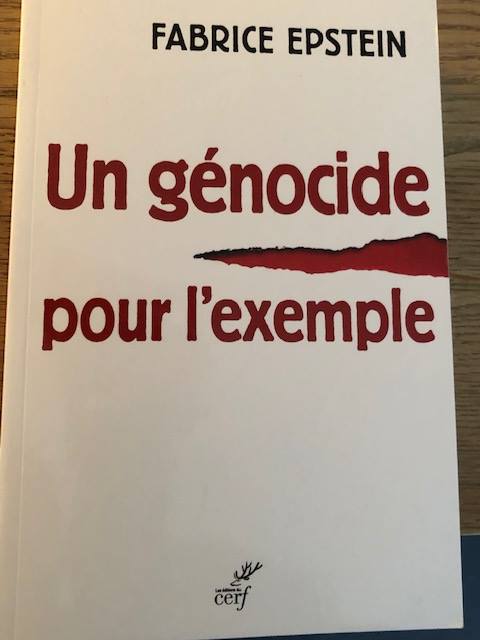
Jambonews: What motivated you to defend Pascal Simbikangwa?
Fabrice Epstein: it when I was secretary of the conference (an oratorical contest organized by the Paris Bar, which at the end twelve “young” lawyers are appointed, for one year, as defence counsels in criminal cases), that I heard about the case of “Captain Simbikangwa”. I talk about that scene in the book as far as I can remember. Alexandra, our tenth secretary, informed other members of the conference that a Rwandan was asking for public defenders. We had vaguely heard of a universal jurisdiction law applicable to mass crimes. Simbikangwa wanted Parisian lawyers because at that time he was defended by a lawyer from Toulouse who could not make himself available when the accused so required.
I immediately jumped at the opportunity. I never really thought about why. But two reasons seemed obvious to me. The first is that it was about the offence of genocide, and I wanted to confront it. The second is that I had been to Rwanda and Tanzania, I had the feeling that it legitimated my candidacy to deal with this case and to understand the complexity of it etc. After a vote, where in my memory, the genocide aroused nothing than indifference or disinterest, Alexandra and I designated ourselves.
Jambonews: You mentioned several times that that this is a case where there are more punches to be taken than given. What do you mean by that?
Fabrice Epstein: Yes, it’s an expression I used, and it’s not very pretty. But the idea is clear. Today, the rhetoric is unambiguous. This was not the case, twenty years ago. Today, therefore, the doxa is clear: Rwanda is a model country, which has been very seriously rebuilt. For 25 years, Kagame and his gang of cut-throats have been in power, they are the new Rwanda and this implies useful categorization and painting with extremely precise outlines: Tutsis are saints, massacred, because they were Tutsis, Hutus are monsters and they must pay for their crimes, until the end of time. In France, the debate is polarized in that way and whoever dares to take the opposite view is labeled as negationist. I have the flaw of not thinking like the doxa, and again, in my approach, I don’t have the feeling of being very dogmatic or extremist, especially since my name and my history allow me to say things that others cannot say. Nevertheless, as Simbikangwa’s or Ngenzi’s lawyer, I am considered by the “well-meaning”, who are often mean and aggressive people to be a negationist. The blows received are many, I do not accept them, but I would almost say that it’s part of the game. What I regret is that the other side doesn’t want to play. They don’t want to debate, they don’t want to discuss, they are afraid to confront their ideas and this has been clearly exposed by very little coverage of my book in media. The desire to censor what basically is a testimony, which embraces the genocide of the Tutsis (and which also embarrasses!), but also a personal history that tries to transcend an inherited victim position.
One last thought. The blows taken only reinforce it, and despite the disappointment, it is impossible for me to get out of this Rwandan matter.So, the blows make you stronger!
Jambonews: If France judges presumed genocidaires, it is because it has acquired the Universal Jurisdiction. What are the strengths and weaknesses of this UJ?
Fabrice Epstein: Of course, universal jurisdiction is a good idea. Judging a foreigner for the crime of the crimes, even though committed abroad, when the person accused of this crime resides on French territory, is an important and great idea and which has many justifications. The problem of universal jurisdiction, at least in France, is its application, or even its applicability. In other words, France does not have the means to achieve its ambitions. The Criminal Procedure Code is not suitable for such a trial. The example of the rights of the defence is the most salient: defence lawyers do not have the same means as the prosecution: financial or procedural means. The consequence is that sometimes the court that judges under universal jurisdiction could find itself in a deadlock. Ask the criminal court to travel to Rwanda to measure the distances between houses, or simply to see, to soak up, it cannot do so because the French legal texts do not allow it. This is absurd, and it does not seem to shock anyone. What is embarrassing with universal jurisdiction as it exists is that the trial becomes a trial for example. It is the idea of genocide that is being condemned, the law does no longer offer any protection, and the accused feels that way.
I am not saying that universal jurisdiction is a bad thing; it should be reformed, if it does not want to become universal incompetence. [Editorial Note: by opposition of the french name of universal jurisdiction: Universal Competence].
Jambonews: In your book we understand that it took you several months to understand the complexity of the Rwandan context; do you think that in an Assize Court the jurors have time to seize it?
Fabrice Epstein: This is an important issue. It took me a very long time to understand the accused, his rhetoric, his way of thinking, his way of answering questions. I wanted not to take him into account to understand the context. For example, I had great difficulty perceiving that the genocide was part of a war, sometimes a guerrilla war. My model was the one of the Shoah, the Jews did not fight against the Nazi regime. They were the victims designated by decree. It was different, and unlike a number of books I read, I didn’t want to focus my reflection on the one I had been familiar with since a very young age, and which, in my opinion, represented a certain ease for researchers, a lighting too convenient to explain a phenomenon that was both unique and singular.
It took me a long time; all the parties involved in the trial were obliged to do a very important job. But this does not mean that jurors or professional magistrates (only the president of the court has the privilege to receive a copy of the file in advance; his two fellow judges discovered its content at the same time as the jurors) do not have the time or cannot understand. The magic of the criminal court is the orality of the procedure and for exceptional trial, exceptional procedure. In a criminal court like this one, experts are called to the stage to explain what genocide is, the history of Rwanda, the Tutsi massacres preceding the genocide, the wars, the interventions of the French army, etc. This allows us to accumulate knowledge quickly. That is not my issue; what bothers me is that it is not possible to invite people, historians and journalists to testify who are not appreciated by the “well-meaning” civil parties. What a circus while on appeal, we had quoted journalist Pierre Péan, who has very interesting things to say on a subject, which he knows very well. Similarly, when I read an excerpts from Bernard Lugan’s book, “Un génocide en question”, which I believe is an excellent summary of the ICTR, the lawyers for the civil parties said that I had an evil book in my hands. That’s what was missing at the different courts of assizes which I took part: a debate, controversy.
Jambonews: A specialist of Rwanda, a historian who French press presents as the most legitimate to talk about Rwanda matters, is not necessarily neither a specialist of Rwanda nor a genocide specialist. Doesn’t the notion of French experts on Rwanda present a problem?
Fabrice Epstein:Yes, of course, I answered a little in advance. Between the experts who do not want to come (even though they really know the subject and are real intellectuals with a critical vision) and those who are activists, with Rwanda, we do not have much luck. In the book, I focused on the intervention of an expert cited by the prosecution who is neither a genocide expert nor of Rwanda. By the way, he had the frankness to acknowledge it at the audience, but be careful, for nothing in the world, he would have refused to come and enlighten a “historical” criminal court. This poses a very serious problem because the criminal court has condemned Simbikangwa, Ngenzi and Barahira, endorsing the statements of this expert, even though he has only recently been to Rwanda and, above all, he is a militant. But I must admit that I can understand why people become militants when they are interested in Rwanda. As with any dictatorship, the discourse is seductive. I understand that there are buyers, Rwanda today is an excellent marketing product, and the Anglo-Saxon influence may not have been worthless.
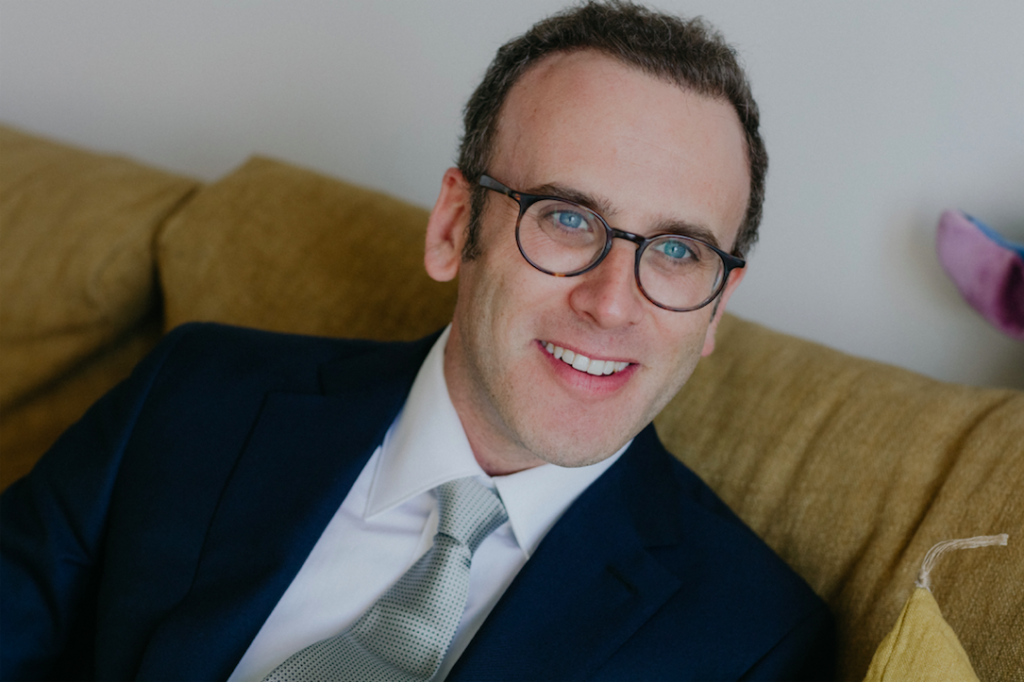
Jambonews: In the book we understand that Simbikangwa’s trial was based on the testimonies, however some testimonies obviously raised doubts about their veracity, did the doubt not benefit the prosecution?
Fabrice Epstein:Yes, perhaps, for a reason, it is that the genocide was committed and there is no doubt about that. Simbikangwa was the victim of a genocide trial, of the need for a French court and indirectly the government to show that more than twenty years later, impunity could not remain, and that the genocide of the Tutsis must be condemned and acknowledged. As you know, in Gisenyi, the testimonies did not stand before the criminal court, the witnesses remembering almost twenty years later, the license plate number of the car Pascal Simbikangwa was driving. In general, the testimonies had been problematic during the investigation. The testimonies as such, of course, but also the conditions for collecting these testimonies. It is a bit like in medicine, the results are distorted if the experiment did not meet a certain number of prerequisites. What to say about those who no longer recognized the accused, those who asked for forgiveness before speaking, or would inquire about the costs of their testimony; and finally those who in the same sentence expressed an idea and its exact opposite, sharply explaining that it was a little of both. The prosecutor’s office had tried an interesting experiment, presenting a false witness in court [editor’s note: a witness, interviewed during the investigation, had been identified as a patented liar; however, the prosecution had wished to summon him to court to answer the defense’s credo: “all witnesses are liars”], to explain that it was not excluded that some lie completely. It was not very convincing, and it tended to raise questions among jurors: why false testimony? For what purpose? Is there really any pressure for those who testify? Why did Simbikangwa not call any defense witnesses when he claims to have saved Tutsis?
Jambonews: In the trials of Pascal Simbikangwa, Justice both acquitted and convicted, is it not a sign of apolitical and impartial justice?
Fabrice Epstein:You could say that. I tend to see justice as inconsistent. First in the quantum of the sentence. Sentencing a man to 25 years in prison, when the court declares him genocidal, I would tend to say that it is not enough. Rather, it shows that there was (and still is) an unease. It was too hard to acknowledge until the end. I am sure that jurors, perhaps too few in number, voted for full acquittal. At the end of the trial, I had the feeling of justice that did not look the accused in the face.
I don’t use the word politic because I’m not comfortable with it. I have the feeling that justice is essentially political. A certain policy, by condemning Simbikangwa, won. Finally, it cannot be said that this justice has been impartial, it has given a place to defense, that is certain, but has not gone to the end of the reasoning. Maybe it was too hard, too sad, I don’t know.
Jambonews: You have a particular way of portraying the men or women who cross your path, are you not afraid that your book will make you enemies?
Fabrice Epstein: In the book, I quoted a sentence from Robespierre to describe Simbikangwa: “I like being accused.” Me, I’m different. I’m rather afraid of being accused, but I live very well with it. Above all, when I think about your question, I realize that I have no enemies. An enemy wants to fight, he wants a duel, a debate, finally a meeting, to ensure his enemy. In my case, it’s very different, no one wants to debate with me, at a conference, on a radio, on a TV; they only want to hear the same point of view over and over.
The book is a testimony; I wanted to tell things as I had experienced them, with honesty, without blushing, without complacency towards others, but also without complacency towards myself. Therefore, I only have friends.
Jambonews: According to Alain Gauthier, you have some issues to settle with yourself. What do you think of that?
Fabrice Epstein: Everyone has a conflict with their past, their present. In this book, and in this fight, I wanted to conduct an investigation to get to the root of things for myself. I don’t really know if Alain Gauthier is able to advise intelligently, but as I have a sense of humour (Jewish), I read with pleasure the review of my book on his blog, and I hope his readers bought it. Besides, I understand his struggle but I don’t appreciate his methods. In any case, I consider that I do not have any accounts to settle with him.
Jambonews: The subject Rwanda is polarizing and you describe it well in your book. Have you caught the Rwanda virus: could you defend another Rwandan case before the Criminal Court or Rwanda is definitely behind you?
Fabrice Epstein: I don’t know if it’s a virus, but it certainly doesn’t leave me anymore. Yes, I’ll agree to defend another case before the criminal court, but I’ll only accept a potential acquittal! But seriously, there is one issue that seems very important to me, and on which I would like to work on, and that is reconciliation. Reconciliation is a subject that interests me, I have the impression sometimes that I am not reconciled with my past and it seems too far away for me to be able to agree with those who killed or wished for the death of my own people. For Rwandans of my age, or a little less, reconciliation is in their hands; it involves marriages, but perhaps at first friendships, debates, joint projects. I would like to participate in this debate, if my wife allows me to!
Jambonews: Why did you use the words “The genocide of Tutsis by the Hutus” on the back cover, it is a stigmatization of all Hutus, what would you say to the Rwandans who will read your book?
Fabrice Epstein: Yes, you’re right, it could be understood as a stigmatization. And this is another example of the difficulty of talking about genocide and gathering the facts in a general formula. It is an editorial choice, to try to explain and allow readers to situate themselves. But in the end, it’s a bad choice because it fails to find a synthesis. We should only have talked about the genocide of the Tutsis or the genocide of the Tutsis and moderate Hutus without targeting potential perpetrators.
To Rwandans who would like and could read my book (I hope it will be translated into Kinyarwanda), I would like to tell them, regardless of the back cover, you have to read this testimony from a non-Rwandan, because it gives keys to understand the reception of the genocide in France. It also tells the story of a Jew who tries to reconcile himself with his history three generations later. There may be paths to explore, experiences to share, for those who feel far from their country, their culture, and an appeasement that the experience of genocide cannot provide. As my grandfather used to say, talking without hate (what I at times succeed in the book; occasionally I say!) is already a part of happiness.
Jambonews: In the book we understand that defending Pascal Simbikangwa earned you being labeled a denialist or negationist. This accusation is not trivial and has form of violence, how have you experienced it?
Fabrice Epstein: Yes, you’re right, like all accusations, this one involves some form of violence. I will not be the first to tell you that a criminal trial is violent by principle. What is perverse in this accusation is the anguish it may contain, but the anguish is also a driving force and in a trial like that of Pascal Simbikangwa, what is interesting and fundamental is for a lawyer like me, the possibility of changing his mind, of evolving in his vision of the genocide, of the accused, of the civil parties etc…. If being a negationist is the use of one’s ability to question a certain number of stereotypes, to detach oneself from those who howl with wolves, from those who want to condemn at all costs for what they suffer, then it does not bother me to be a negationist.
You know, I was also called a “unicist”. In the mouths of those who said it, this means that the Shoah is considered unique, and it makes you a negationist, because you do not put the genocide of the Tutsis on the same level. I persist and sign, we cannot compare these two disasters. And if that’s what it means to be a negationist, then again I assume. Besides, people who accuse me of being a negationist just have to sue me, I have an excellent lawyer (my partner).
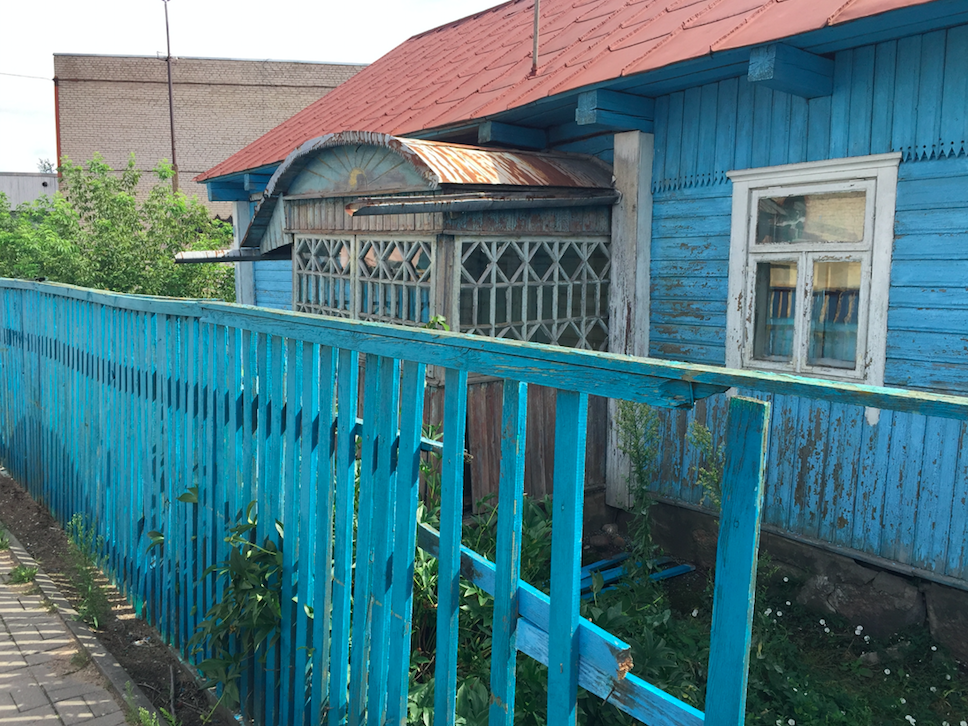
Jambonews: What about Belarus in this story? Did you need to go through Murambi to discover Kletsk?
Fabrice Epstein: Belarus is a dotted line in this story. It was only during Pascal’s trial (between the first instance and the appeal) that I knew that my paternal grandfather’s family came from Kletsk. I also learned at that time that they had not died in a camp, but in what is called the shoah by bullets. It was a revelation. After that, I wanted to go there. I wanted to “go back” there ever since. Belarus is a country that has also been sacrificed by the Russians and Germans, a country on whose soil both sides have wiped themselves.
And when I had went to Murambi, I had to say that I didn’t know my origins. How many Ashkenazi Jews think they come from Poland, without knowing the villages where their ancestors were born? What is curious is that it is quite easy to find the traces, because the Jews of the Book only swear by the books. Each shtetl has its own yitzkor book, a souvenir book, a compilation that brings to life the people who inhabited the shtetl, this small Jewish village. The link is obvious with the hills of Rwanda.
And yes, to join Kletsk, I most certainly had to go through Murambi. After the verdict of March 2014, I was even more in search of my identity. I had to know and leave and I applied the maxim of Rabbi : “Do not ask your way to the one who knows you, you would risk not going astray”.
Jambonews: Can you tell us a few words about your grandfather?
Fabrice Epstein: My grandfather died a few months after I was born. They say he absolutely wanted to meet me. I know he had blue eyes, and spoke many languages. I know that he was a humanist on the outside and a difficult person on the inside (in the silence of the home). My regret is that I couldn’t take the time to talk to him, to exchange. When I was young, I lacked a culture or rather an interlocutor for whom culture, knowledge, knowledge were cardinal values. My grandfather never talked about others, but about the Bible, about Israel, about subjects other than the little jealousies of everyday life. Maybe I’m idealizing him a little, but I miss his presence. This book is a tribute I pay to him, to our culture, to our memories, to his language, to his heart. Curiously, the book is not dedicated to him. In addition to my wife (who is and was an angel during the anxious writing of the book), the book is dedicated to the memory of my great uncle, Leon says Leo Klausner, a man I imagine tall and strong, mechanic, who died in Auschwitz in the last weeks of the camp’s life. I wish I had known him. Leo was my grandmother’s brother. It is said that after the Shoah, in Lons-le-Saulnier, someone was driving a truck with his company name. I am not sure if this information is true. Moreover, the book raises the question of memory, but also of the imagination, which makes it possible to reconcile several visions of things.
Jambonews: In the book you feel a little Rwandan, it’s just an impression?
Fabrice Epstein: A little bit! You mean completely. I would have been nicknamed “Inyaryenge”!
Jambonews: Do you want to add a few words?
Fabrice Epstein:I hope I have said it all. Thank you very much for giving me this interview.
“Genocide for example” in brief
In 2007, Fabrice Epstein, 25 years old, forced his fate to be part of the legal and humanitarian trip to Rwanda and Tanzania organized by his teacher and president of the Pontoise Bar. On this occasion he discovered the beauty of Rwanda, a country that was recovering from the genocide against the Tutsis, a country under reconstruction. This journey had the appearance of a “pilgrimage”, he writes, Rwanda of memorials, the country of a thousand faces, the countries of a thousand churches, these sanctuaries in which the blood of the Tutsis flowed. They stopped at the Murambi Memorial site, on this site Fabrice Epstein surprised the guide by asking him a question out of nowhere: “I ask him to explain to me what a skull, a femur, a Tutsi tibia? ». The answer and context to this question can be found in the book! From Rwanda to Tanzania, from the Rwandan courts to the ICTR to the Gacaca people’s courts, Fabrice Epstein’s insight has enabled him to detect the comedy, lies or hypocrisy of these courts.
If we rely on the title “Genocide as example”, we could believe that this book is yet another book on the genocide in Rwanda. This book stands out from other books on this subject by the diversity of its content. We discover the judicial environment: prison, investigating judges, prosecutors, lawyers, magistrates, civil parties. This environment is described in such a way that the reader can project himself into the shoes of a lawyer. Fabrice Epstein has the ability to put words, using metaphors, on complex concepts. We accompany him in his discovery of the history of Rwanda, from the simplistic and Manichean version (the good against the bad) to the nuanced version: “I refused to let a binary story be written where the Hutus are the bad guys and the Tutsis the saints“.
“Genocide for example” is also a journey through several countries: Italy, France, Tanzania and Belarus. A story of a victim inherited from the Shoah, a cosmopolitan identity and an atypical look at the world. Finally, it is a disconcerting encounter between two men: Pascal Simbikangwa, accused of the crimes of genocide and who thinks that his lawyer will never be able to understand the complexity of his case and Fabrice Epstein, a public defender whose great uncle was deported to Auschwitz and his father’s family exterminated in Belarus. The first one finally confessed to his lawyer. “Mr I am happy, you seem to have more and more control over the case” and the second one ended up believing in the innocence of his client.
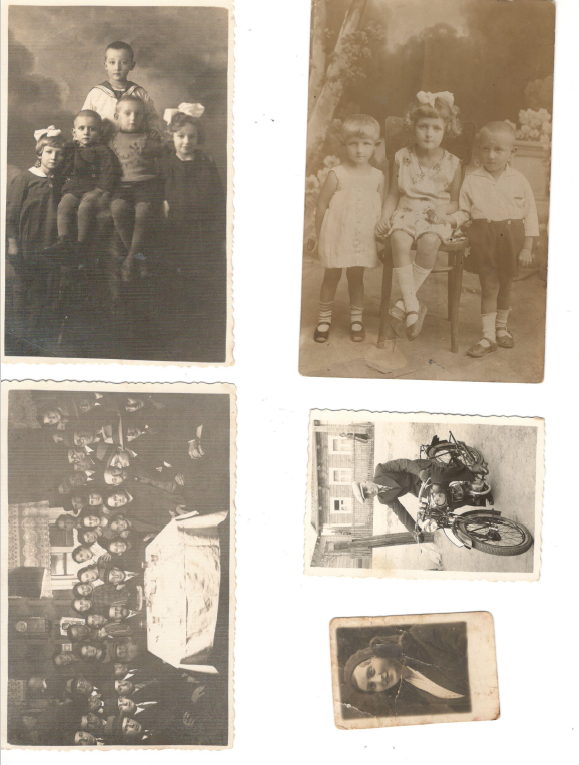
Constance Mutimukeye
www.jambonews.net
[1]https://www.capital.fr/votre-carriere/ces-avocats-qui-uberisent-le-droit-1269230




